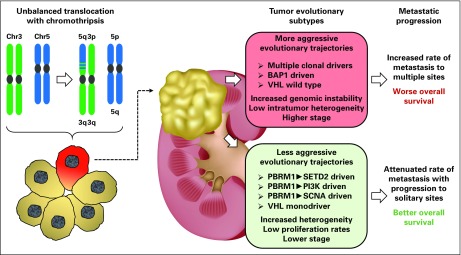Fig 3.
Recent analysis using multiregional whole-genome and whole-exome sequencing in a cohort of 100 patients with clear cell renal cell carcinoma (ccRCC) has elucidated a model of tumor evolution for ccRCC. The earliest genetic alteration in the tumorigenic evolution of a sporadic ccRCC was shown to be loss of chromosome 3p, with the most frequent mechanism being an unbalanced translocation resulting in simultaneous loss of chromosome 3p and gain of chromosome 5q with chromothripsis at the breakpoint. This early tumor-initiating cell subsequently develops further genetic alterations to become a ccRCC, and two different groups of evolutionary trajectories were identified based on the sequential gain-of-mutation events, the degree of intratumor heterogeneity, and level of genomic instability. More aggressive evolutionary trajectories were associated with more rapid metastasis to multiple distance sites and poorer overall survival.

